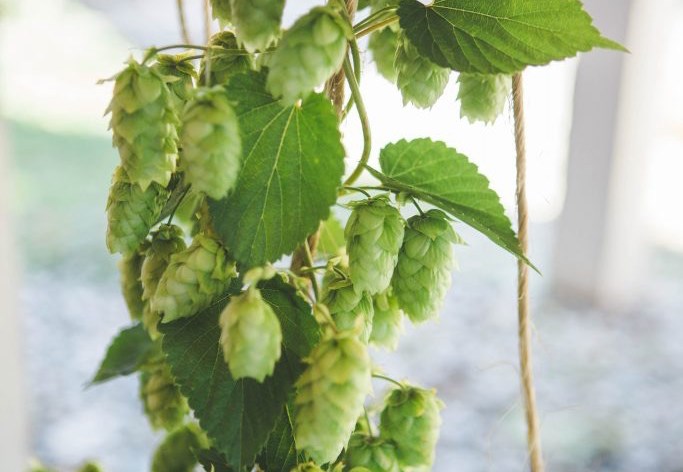Ìı
The concept of terroir and its influence areÌıenthusiasticallyÌıdebated in the wine world. Very few of the beer geeks I asked cared one whit about terroir, and hadnât evenÌıgiven it a thoughtÌıbefore I asked.
After some debate, they decided that although it was an interesting philosophical question, terroir didnât matter to their beer drinking experience or influence their beer purchases.
The casual beer drinker isnât interested in the minutiae of which malts or hops are chosen for the beer,Ìılet alone where theyâre grown.ÌıThey just care thatÌıthe final product tastes good. So there you have it.ÌıThe beer world doesnât care about terroir.
Enter Harley SmithÌıand Tracy McLeanÌıof Longwood Brewing.ÌıTheyÌıcare.ÌıTheyÌıcareÌıa lot.
But before we get to whyÌıthey care, and why you might also,Ìıallow me to drone on aboutÌıwhatÌıâterroirâÌımeans.ÌıIndulge me please, IÌıreadÌıa LOT on the topic.
TerroirÌıisÌıthe concept that states that where somethingÌıgrowsÌıaffects its make-upÌıinÌımany ways,Ìımost importantlyÌıits flavour.Ìı
TerroirÌıaccounts for natural influences like soil and climate, often in very small areas of land, producingÌıdifferent characteristics in crops.ÌıIf identical crops grown a couple of kilometres apart have measurable differences from each other, those differencesÌıare attributed to terroir, and are believed toÌıaffectÌıflavour. Ìı
The concept of terroir grew out of Burgundy, France, evolvingÌıfrom a defining aspect of agricultural production into a marketing concept and economic protection mechanism.Ìı
âTerroir is about asserting and justifying differences at local and even micro levels and ultimately of acquiring social, economic and political benefits from such claims,âÌıaccording toÌıMarionÌıDemossierÌıof the University ofÌıBath.
We can thank terroir for theÌıAppellationÌıdâOrigine ContrôléeÌı(AOC)Ìıin France and the AmericanÌıViticultural AreasÌı(AVA).ÌıIn a nutshell,Ìıthese two systems protect the namesÌıof geographical regions from being used on productsÌıfromÌıoutside those areas.
No calling that bubbly wine âchampagneâÌıunless those grapes wereÌıgrown in the Champagne region!
Terroir is meant to evoke a sense of place.ÌıAnd some places justÌıproduceÌıbetter tasting things, OK?
But do not mistakeÌıterroir for the locavore movement.ÌıAlthough related to farm-to-table, terroir does notÌınecessarilyÌıcelebrateÌılocalÌıproducts.ÌıItÌıisÌıconcerned withÌıwhichÌıgrowing areasÌıproduce the best crop, andÌıtheÌıuse of traditional methods to bring out that unique flavour in the finished product.Ìı
The French know you get your wines fromÌıspecificÌıregions, your cheesesÌıfrom othersÌıand your produce from yet others.ÌıÌıThere is none of the 100-kilometre diet inÌıterroir.ÌıIf the best cropÌıgrowsÌı600 km away, then that is the one that should be had.
From a marketing perspective, terroir is a golden concept.ÌıElevateÌıone areaâs foodstuffsÌıaboveÌıthe restÌıand give people a story to go along with theÌıfinalÌıproduct,Ìıand theyâreÌılining up to pay large sums for it.Ìı
If you can convince the world of your superiority, tourists will flock to yourÌıanointed landsÌıand spread the doctrine, multiplying your customer baseÌıand driving up profitsÌıas they go.
If youâre still with me after that long tripÌıthroughÌıterroir, you wonâtÌıbe surprised that not much about itÌımakes meÌıeager to apply it toÌımy belovedÌıbeer.Ìı
ButÌıwait!ÌıI want beer toÌıclaimÌıterroir!ÌıNot least because then we can convince whoever becomes the agricultural minister that beerÌıhas gravitas âÌıthat beerÌıis as important to the economy as wine.ÌıThenÌıtheyâll change the ALR rules to allow Persephone
Brewing to keep their farm brewery, and joy will abound!
Hear ye! Hear ye!ÌıI propose that,Ìıjust like the New World took Old World brewing traditionsÌıand made them our own,Ìıwe take the Old World conceptÌıof terroir and make it our own.ÌıLetâs keep the sense of place,Ìıthe belief that where something is grown comes out in its flavour,ÌıandÌıthe desire to produce the best crop.ÌıWeâllÌıditch the protectionism, the profiteering and the snobbery.
And this is whereÌıHarley and TracyÌımake their entrance. Ìı
Familiar with terroir from drinking wine, Harley and Tracy associateÌıthe term with Longwoodâs beer.Ìı
âIt seemed to aptly describe what we were doing, which is simply supporting our local farmers to create a community-driven beer,â they told me.ÌıTerroirÌıis important to them âbecause it describes the regional flavour derived from years of working with the farm community to create a uniquely local beer.â
As they point out, nothing tastes as good as that tomato you grew in your backyard/container garden. Ìı
âIf you want to create a uniquely original flavour there is no substitute for controlling all your ingredients from start to finish.âÌıYes!ÌıThis isÌıhowÌıterroirÌımatters!
One-hundred per centÌıofÌıLongwoodâsÌıcurrentÌıhop supply comes from within 20 km of the brewery, andÌı50 per centÌıof their barley comes from central Â鶹´«Ã½Ó³»Island.ÌıThey rely on the local community to buy their beers and in turn they support their local growers.ÌıTheirs isÌıaÌıreciprocal relationship from which we all benefit.ÌıItâs the New World version of the farmhouse ale!
Longwood isÌıamong manyÌıBC craftÌıbreweries thatÌıbrew with authenticity,ÌıintegrityÌıand strong commitment to the communities they serve.ÌıThe use of locally grown, organic, creative and foraged ingredients is becoming widespread as craft beer comes of age.ÌıIf thatâs what terroir can mean, then damn, Iâm glad itâs in my beer!
Ìı



